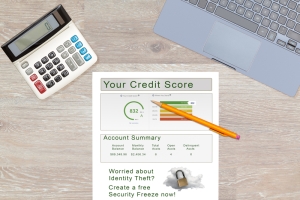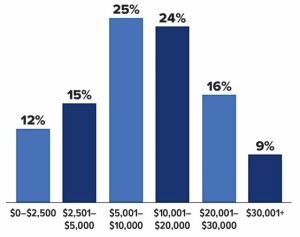Did you spend a little too much this past holiday season, and as multiple credit card bills start to roll in – are you wondering how you’ll be able to pay them off before the next holiday season begins? If so, consolidating multiple sources of high interest debt into one simple monthly payment, just might be the right financial solution for you.
What is a debt consolidation loan?
Essentially, a debt consolidation loan is a type of personal loan – and is typically a fixed rate installment loan offered by most financial institutions, such as your local bank or credit union. This loan can help you manage and pay off multiple debts by combining the balances into a new loan that has one simple monthly payment. This type of loan may allow you to pay off your debt quicker and potentially even come with a lower interest rate than what you were previously paying. In addition, a debt consolidation loan can be used as a tool to help you budget better – since you’d be consolidating any other bills you were paying throughout the month into one combined loan payment.
How might my credit score be affected?
Depending upon the other sources of debt you have, a debt consolidation loan may actually help improve your credit score – since there would ideally only be one monthly loan payment to keep track of, you can focus on making on time payments to that loan, and it will reduce your credit utilization too.
Are there reasons I shouldn’t consider a debt consolidation loan?
If you don’t take an honest look at your spending and make yourself a promise to create and stick to a monthly budget – a debt consolidation loan probably won’t help you. In fact, if you consolidate the majority of your debt and then continue to use those previously paid off credit cards – you risk getting yourself deeper into debt. Should you find that you have been spending more than what you earn, you will need to consider making some lifestyle changes or creating additional income in order for true debt consolidation to work.
Are there other alternatives to applying for a debt consolidation loan?
- Credit Card Balance Transfer: This typically involves transferring other credit card balances to a new card with a lower interest rate which lasts for a limited time. This alternative method may work for you if you have a set plan to pay off the transferred balance by the end of the term, and not use the card for any new purchases unless they are paid in full immediately. If you are still carrying a balance once the promotional offer ends, the interest rate on the card will likely increase – in turn, adding to your monthly payment amount on any remaining balance.
- Home Equity Loan: This type of loan allows you to borrow against any equity you have in your home, using your home’s appraised value and what is still owed on your mortgage. If the loan isn’t paid back in full, you can risk foreclosing on your home. Some lenders also tack on closing costs to home equity loans, which likely won’t help you manage the debt you are trying to consolidate if these closing costs are several hundred or a few thousand dollars. If you are considering using the equity in your home to pay off debt, it is imperative that you do your research and can achieve paying back the amount borrowed (plus any closing costs) – in full and on time.
Any final advice before applying?
If you can commit to a strict debt repayment plan, taking a hard look at your budget, and not adding on any new debt during the consolidation loan payoff period – this loan type might be the right financial move for you, especially if it’s being used pay off any lingering debt from last year as a new year begins.
Does First Financial offer consolidation loans?
If you live, work, worship, volunteer, or attend school in Monmouth or Ocean Counties, you can apply for our consolidation loan in any of our local branches, by phone at 732.312.1500 Option 4, or online 24/7. We offer fixed monthly payments, flexible terms up to 60 months, and no pre-payment penalties if you’d like to pay your loan off before the end of your term.* Learn more and get started.
*APR = Annual Percentage Rate. Actual rate will vary based on creditworthiness and loan term. Subject to credit approval. Personal Loan repayment terms range from 12 to 60 months, and APRs range from 10.24% APR to 18% APR. Minimum loan amount is $500. Loan payment example: A $2,000 Personal Loan financed at 10.24% APR for 24 months, would have a monthly payment amount of $92.51. A First Financial Federal Credit Union membership is required to obtain a Personal Loan or Line of Credit, and is open to anyone who lives, works, worships, volunteers or attends school in Monmouth or Ocean Counties. A $5 deposit in a base savings account is required for credit union membership prior to opening any other account/loan.








